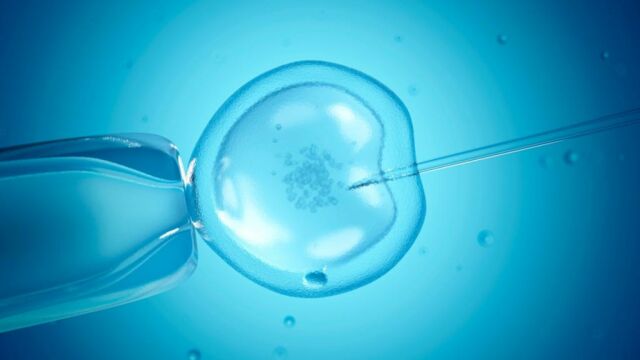Some of you might have thought you were reading this wrong, but you are not dreaming! Although other babies have been born to three parents in the past, this is the first time in British history. Some people have said they are worried about such an incredible scientific prowess becoming the norm. Well, they can rest assured, as this type of IVF is extremely well supervised.
Discover our latest podcast
This baby, born from three different DNAs, could be the key to reducing risks of inherited mitochondrial diseases in babies. Having three different DNAs might also mean that babies who would not have survived birth, could actually be born healthy.
This baby was born to two mums and a dad
It is thanks to a DNA test that the technical prowess was allowed. Although the child in question is not really born from three people making a baby together, in the 'traditional' sense, it is still born thanks to DNA from three different people. The competent British authority in this matter, the Human Fertilisation and Embryology Authority, has confirmed this.
For now, the child's gender has been kept confidential, but it has been confirmed that most of the baby's genetic code comes from its two parents, one male and one female, but 0.1% of its DNA comes from an external donor. So, one can wonder why did a third party have to be involved in the baby's DNA?
UK scientists have confirmed the birth of the very first baby that has DNA from three different people. pic.twitter.com/tX2yPLLjkf
— Yup That Exists (@yupthtexists) May 11, 2023
Read more:A medical miracle: This baby is just one year younger than her mother
An innovation to fight against mitochondrial diseases
Mitochondrial replacement therapy (MRT) is a new form of IVF (In Vitro Fertilization) aimed at preventing the baby from inheriting mitochondrial diseases. IVF can take place after the fertilization of the egg by the sperm or before. Mitochondrial diseases are incurable diseases that can be fatal to newborns, to the point of causing their death within hours after their birth.
This is a medical innovation that, according to its promoters, will allow families with this genetic deficiency, to have a healthy child. According to the Children's Hospital of Philadelphia:
Mitochondrial disease can cause a vast array of health concerns, including fatigue, weakness, metabolic strokes, seizures, cardiomyopathy, arrhythmias, developmental or cognitive disabilities, diabetes mellitus, impairment of hearing, vision, growth, liver, gastrointestinal, or kidney function, and more.
Babies who have DNA from three different people born in the U.K. for first time
— Wittgenstein (@backtolife_2023) May 11, 2023
Source: https://t.co/vGww07Fi7Ppic.twitter.com/1SBYyjfB12
Read more:French parliament passes law extending IVF rights to lesbians and single women
IVF is a highly regulated practice
Mitochondria are small 'factories' that produce energy via a production chain called the respiratory chain, and allow cellular respiration. If these are defective, they will not be able to feed the body, which can cause, among other things, brain damage or heart failure.
Dr. Dagan Wells, a professor of reproductive genetics at the University of Oxford who took part in the research, told the Guardian:
So far, the clinical experience with MRT has been encouraging, but the number of reported cases is far too small to draw any definitive conclusions about the safety or efficacy,
Long-term follow-up of the children born is essential. The stage of development when reversal happens is unclear, but it probably occurs at a very early stage. This means that prenatal testing, carried out [at] about 12 weeks of pregnancy, may well succeed in identifying if reversal has occurred.
Sarah Narcross, the director of the Progress Educational Trust, told the BBC:
News that a small number of babies with donated mitochondria have now been born in the UK is the next step, in what will probably remain a slow and cautious process of assessing and refining mitochondrial donation
Ms Narcross sought to reassure critics of this medical innovation who see it as a form of eugenics, as if to create 'the perfect baby'. Further research must be carried out over time, in order to guarantee the absence of mitochondrial diseases during the child's life.
First UK mitochondrial-replacement babies:
— 🧬Dr. Namrata Datta (Singa Pen), PhD🧫🇬🇧🦘🇮🇳 (@DrDatta01) May 12, 2023
The first children in the United Kingdom with DNA from three people have been born using mitochondrial replacement therapy (MRT). The procedure aims to prevent the baby from inheriting mitochondrial DNA mutations by putting one parent’s…
Read more:NHS loosens restrictions on IVF. Here’s how it benefits you
This article has been translated from Gentside FR.
Sources used:
Children's Hospital of Philadelphia: Mitochondrial Diseases
Guardian: First UK baby with DNA from three people born after new IVF procedure
BBC News: Baby born from three people's DNA in UK first















